Autoignition Studies of trans- and cis-Decalin in an Ignition Quality Tester (IQT) and the Development of a High Thermal Stability Unifuel/Single Battlefield Fuel
Document Type
Article
Publication Date
2009
Publication Source
Energy and Fuels
Abstract
A coal-based thermally stable fuel, referred to as JP-900, was investigated as a potential single battlefield fuel (SBF or “unifuel”). Any proposed SBF or unifuel will have to meet all previous jet fuel specifications with the additional requirement of having an acceptable cetane number. The JP-900 (X1390) jet fuel cut was blended with biodiesel, NORPAR 13, Syntroleum synthetic jet fuel (S-8), and a Sasol high-temperature Fischer−Tropsch (HTFT) diesel fuel. The autoignition propensity of these mixtures was then measured in an ignition quality tester (IQT). From the IQT results, a “unifuel” composed of JP-900 P67-132 and NORPAR 13 was used in a 2.5 L DDC/VM Motori engine. Emissions and heat release data showed no significant difference from an ultra-low sulfur diesel (BP-15). From the autoignition for these fuels and a correlation of autoignition with fuel composition, it was found that the proportions of the isomers of decalin played a key role. It was observed that cis-decalin is significantly more reactive in the autoignition process than trans-decalin, with derived cetane numbers of 41.6 and 32.0, respectively. The findings suggest a combination of cis-decalin with single-branched long-chain iso-paraffins allows for the desired derived cetane number while meeting other jet fuel specifications.
Inclusive pages
5879–5885
ISBN/ISSN
0887-0624
Copyright
Copyright © 2009, American Chemical Society
Publisher
American Chemical Society
Volume
23
Issue
12
Peer Reviewed
yes
eCommons Citation
Heyne, Joshua S.; Boehman, Andre L.; and Kirby, Steven, "Autoignition Studies of trans- and cis-Decalin in an Ignition Quality Tester (IQT) and the Development of a High Thermal Stability Unifuel/Single Battlefield Fuel" (2009). Mechanical and Aerospace Engineering Faculty Publications. 228.
https://ecommons.udayton.edu/mee_fac_pub/228
COinS




Comments
Permission documentation on file.